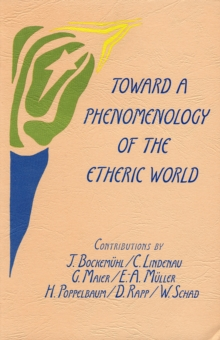For more than three centuries, scientists have studied the world as detached observers. In doing so, science has achieved marvelous results, but it has also lost the sense of the whole that earlier cultures possessed. By concentrating on the "text" of the physical world, science has lost the context--the etheric world of life forces.
Goethean phenomenology (so named for Goethe's observations) is a scientific method capable of bringing the clarity of natural science to this context of phenomena. Unconsciously, scientific observers have always been using the context to read the text. The phenomenological method involves training observers to look at the activity of thinking itself as it perceives intentionally. It then uses this activity itself as a means of perception. The observer thus becomes conscious that physical nature is indeed a text, and that its meaning derives from the etheric context.
Unlike the more common hypothetical and deductive methods--which presupose a detached observer--the phenomenological method is based on active participation by the observer. This eliminates the need to construct speculative hypotheses; the observer's awareness of his or her own intentionality ensures the veracity of the observations. The etheric world is not a new hypothesis; it is, however, a new domain of observation.
The authors--Jochen Bockem�hl, Christof Lindenau, Georg Maier, Ernst-August M�ller, Hermann Poppelbaum, Dietrich Rapp, and Wolfgang Schad--have all written extensively on "participatory" science and related matters. In this ground-breaking collection, they each explore an aspect of the etheric world and its relationship to human thinking. They systematically lead the reader into the "formative movements" of nature and offer genuine insight into the far-reaching mystery of life.
The above book draws its inspiration from the work of Rudolf Steiner





No comments:
Post a Comment